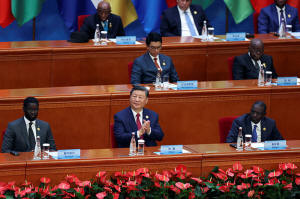China stops short of Africa debt relief as it pledges more cash
 Send a link to a friend
Send a link to a friend
 [September 07, 2024]
By Duncan Miriri and Laurie Chen [September 07, 2024]
By Duncan Miriri and Laurie Chen
NAIROBI/BEIJING (Reuters) - China stopped short of providing the debt
relief sought by many African countries this week, but pledged 360
billion yuan ($50.7 billion) over three years in credit lines and
investments.
The Forum for China-Africa Cooperation (FOCAC) launched in 2000 took on
an enhanced role after the 2013 inception of President Xi Jinping's Belt
and Road Initiative (BRI), which aims to recreate the ancient Silk Road
for the world's second largest economy and biggest bilateral lender to
Africa.
"China is moving back on to the front foot in terms of overseas
deployment of capital in the emerging markets," said Tellimer's Hasnain
Malik, while adding it was not yet at pre-COVID levels.
China has also sought to use FOCAC to counter growing competition in
Africa from the United States, the European Union, Japan and others.
In Beijing, diplomats and delegates from around the world mingled in the
Great Hall of the People in Tiananmen Square as leaders from more than
50 African countries and Chinese officials led by Xi gathered for a
group photo.
The new financial pledge is more than what Beijing promised at the last
FOCAC in 2021, but below the $60 billion of 2015 and 2018, which marked
the peak of lending to Africa under the Belt and Road Initiative.
During those peak years, Beijing bankrolled the construction of roads,
railways and bridges. But a drying up of funds since 2019 has left
Africa with stalled construction projects.

The new funds will go towards 30 infrastructure projects to improve
trade links, China said, without giving details.
The 54-nation continent of more than 1 billion people has an annual
infrastructure funding deficit estimated at $100 billion, and needs
transport links to make a new giant pan-African trade bloc (AfCFTA) a
reality.
Beijing has in recent years cut funding for such projects as it shifted
focus to "small and beautiful" projects, mainly due to its own domestic
economic pressures and an increase in debt risks among African
countries.
Asked how the new commitments fit into China's current cautious overseas
lending strategy, a foreign ministry spokesperson said there was no
contradiction.
"The cooperation between China and African countries, including the
specific implementation of projects, is discussed and determined by both
sides," Mao Ning, a foreign ministry spokesperson told a regular news
conference on Friday.
CURRENCY SWAPS
China also said it will launch 30 clean energy projects in Africa, offer
co-operation on nuclear technology and tackle a power deficit that has
delayed industrialization efforts.
[to top of second column]
|

Chinese President Xi Jinping applauds as he attends the opening
ceremony of the ninth Forum on China-Africa Cooperation (FOCAC)
Summit alongside Senegalese President Bassirou Diomaye Faye, Kenya's
President William Ruto and other leaders, at the Great Hall of the
People in Beijing, China September 5, 2024. REUTERS/Florence Lo/File
Photo

"The outcomes of the FOCAC summit signal an impetus for green
projects and especially for renewable energy installations," said
Goolam Ballim, head of research at South Africa's Standard Bank.
China has become a global leader in wind and solar energy, Ballim
said, controlling significant supply chains and reducing production
costs.
Others were skeptical.
"The issue is not so much about the size of the investments, it's
been about the lack of transparency around the terms of the debt,"
said Trang Nguyen, global head of emerging markets credit strategy
at French bank BNP Paribas.
Success was less clear-cut for countries owing a large share of
their debt to China, which made no express offer of assistance to
those struggling with repayments.
Beijing instead urged other creditors "to participate in the
handling and restructuring of African countries' debts under the
principle of joint actions and fair burden-sharing".
African leaders hoping to bask in large deals for their countries
had to settle for less splashy announcements.
Ethiopia and Mauritius announced new currency swap lines with
China's central bank. Kenya said it made progress on talks to reopen
the lending taps for key projects like its modern railway to link
the region.
Still, there was optimism from some, as they welcomed China's
increased commitments to Africa's security, humanitarian challenges
and other non-financial affairs.
"After nearly 70 years of hard work, China-Africa relations are at
their best in history," Tanzania's President Samia Suluhu said on
her X account.
($1 = 7.0844 Chinese yuan renminbi)
(Reporting by Duncan Miriri and Laurie Chen in Beijing; Additional
reporting by Joe Cash in Beijing and Libby George in London;
Graphics by Sumanta Sen, Editing by Karin Strohecker and Alexander
Smith)
[© 2024 Thomson Reuters. All rights
reserved.]This material
may not be published, broadcast, rewritten or redistributed.
Thompson Reuters is solely responsible for this content.
 |